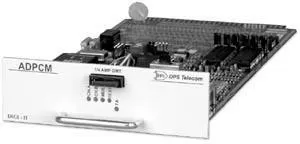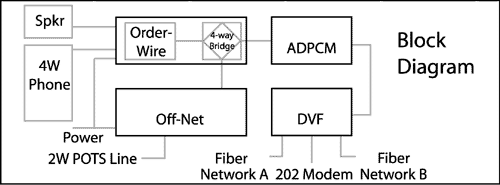Check out our White Paper Series!
A complete library of helpful advice and survival guides for every aspect of system monitoring and control.
1-800-693-0351
Have a specific question? Ask our team of expert engineers and get a specific answer!
Sign up for the next DPS Factory Training!

Whether you're new to our equipment or you've used it for years, DPS factory training is the best way to get more from your monitoring.
Reserve Your Seat TodayDPS Telecom's new Adaptive Pulse Code Modulations (ADPCM) card may well be the future of supervisory applications in the world of digital communications!
With a channel width of only 24 kilobits, the ADPCM leaves plenty of bits on the normal 64 Kbit channel for alarm and other supervisory uses.

Preliminary tests on the AT&T network indicate that voice quality degradation with the 24 Kbit channel is not detectable!
This breakthrough allows both order-wire voice and alarm system data to join together on the same portion of the digital spectrum.
The ADPCM card fits nicely in the expansion card slot of DPS' FDO 1000 order-wire chassis, making a single rack-unit package.
The ADPCM card includes two active VF ports that can be bridged for repeater applications or used to interface the FDO 3000 Off-Net. The receive ports are digitally mixed to reduce noise build-up through the network.

To find out more, contact DPS Sales at 1- 800-693-0351 for information.
Greg Linn of ARCO is grateful that his T/MonXM alerted him to an impending disaster on a recent Friday afternoon. A microwave link from their operations center to a nearby city was threatened when a power supply went into alarm.
"We were able to get a repair person out there to take care of it before it became a major problem," stated Greg. "That would have been real embarrassing, and obviously costly to the company."

ARCO'S network is monitored by two T/MonXM workstations, located in California and Texas. The T/Mons operate in master/slave mode, allowing each to display the status of the entire network. One unit manages the polling while the other "stands by'' to resume polling if the first one is cut off from the network.
Remote network elements gather alarm data at locations in-between the two monitoring centers. The T/Mons also monitor devices reporting with ASCII data.
ARCO recently added LAN access to their T/MonXM workstations.
Greg noted that the LAN "works really well. I can log on in the morning with it right in my office. Now I don't have to actually walk downstairs.'' ARCO'S network alarms can be viewed from any workstation on the LAN.
Next Page: DVF 64 Card